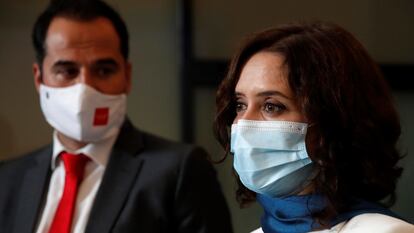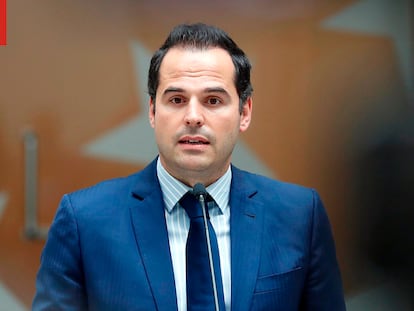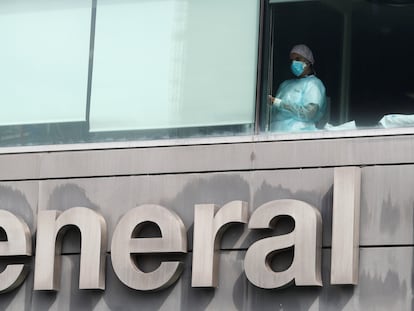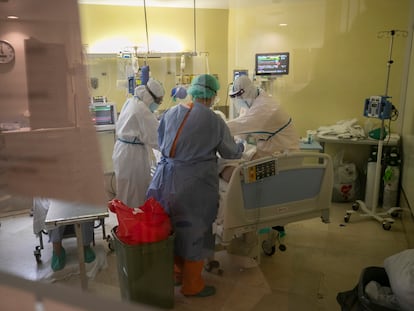Madrid asks central government for help amid chaotic handling of coronavirus crisis
Deputy premier calls on PM Pedro Sánchez to “actively get involved,” and the latter suggests a face-to-face meeting with the regional leader

The deputy premier of Madrid, Ignacio Aguado, on Thursday called on the central government to “actively get involved” in efforts to contain the spread of the coronavirus in the region. The politician from center-right party Ciudadanos (Citizens) held a news conference during which he recognized that “the situation of the epidemic in Madrid is not going well. It is getting worse. We are going to have to make greater efforts.”
But Aguado did not clarify whether the regional government in Madrid – which is run by a center-right coalition of the Popular Party (PP) and Ciudadanos, with the support of far-right Vox – would be asking Prime Minister Pedro Sánchez of the Socialist Party (PSOE) for help declaring of a state of alarm in the region, thus paving the way for lockdowns or confinements.
Shortly after Aguado’s public statements, Prime Minister Pedro Sánchez sent a letter to Madrid regional premier Isabel Díaz Ayuso, of the PP, to suggest a face-to-face meeting at her office. On Friday afternoon, authorities announced that the Sánchez-Ayuso meeting will take place at noon on Monday at the headquarters of the Madrid regional government.
Madrid premier Díaz Ayuso welcomed the offer to meet with PM Pedro Sánchez, saying the region “has been all alone for far too long”
The letter expressed the central government’s willingness to help Madrid regional authorities while respecting the latter’s powers over healthcare policy. This includes the possibility of Madrid requesting the declaration of a state of alarm for its own territory, in what would be a small-scale version of the national emergency state that Spain experienced from March to June. But so far, Madrid authorities have not shown a willingness to take that step, instead leaning towards the possibility of selective confinements in the hardest-hit parts of the capital and region. An announcement on new measures to curb transmission in Madrid is expected later on Friday.
Díaz Ayuso responded positively to the offer to meet and said her team was already working on a date. On Twitter, she later lamented that the Madrid region “has been all alone for far too long” and celebrated the fact that Sánchez “has finally agreed to meet with me.”
But Thursday’s appeal for help represents a significant change in the Madrid government’s rhetoric of the past few months. Until now, regional officials had complained that the centrally declared state of alarm, which saw devolved powers temporarily centralized, had prevented them from handling the crisis in an effective way.
We are in time to control the situation, to control the curve, if only we are able to give ourselves some political respite. We need to stop assigning blameIgnacio Aguado, deputy premier of the Madrid region
The public call for help came a day after a serious communications blunder by the regional government. On Wednesday, Madrid deputy health chief Antonio Zapatero suggested that there would soon be selective confinements in parts of the capital and the region that have high rates of coronavirus infections. But sources close to regional premier soon backtracked on that claim, stating that no decisions have yet been made and that there are other options on the table.
On Thursday, Aguado insisted that “we are in time to control the situation, to control the curve, if only we are able to give ourselves some political respite. We need to stop assigning blame. It is necessary and urgent for the government of Spain to actively get involved in controlling the epidemic in Madrid, and I have said as much to premier Isabel Díaz Ayuso, whom I fully support," he continued. “It is absolutely impossible for the regional government to eliminate an epidemic of this nature all by itself.”

Covid-19 containment measures were reverted fully to regional governments by Prime Minister Pedro Sánchez when Spain’s 99-day state of alarm was lifted in June and the country gradually adopted a “new normality” that no longer involved restrictions on mobility.
The far-right Vox, which made the PP-Ciudadanos coalition government possible with its votes last year, did not seem convinced by the deputy premier’s change of tack. “What I’m seeing here is indecision,” said the party’s regional leader, Rocío Monasterio. “Your job is to govern, not to pass on responsibility to third parties.”
Members of Díaz Ayuso’s team said that the regional premier has spent months asking central authorities for a national strategy against the coronavirus, as well as the legal tools that would allow a regional government to confine municipalities, and more controls at Adolfo Suárez-Madrid Barajas airport.
But these same sources would not reveal whether the latest conversation between Díaz Ayuso and her deputy Aguado included the possibility of asking Prime Minister Sánchez for a declaration of a state of alarm. Sánchez recently guaranteed regions that the lower house of parliament, the Congress of Deputies, could approve a localized state of alarm that would permit them to confine or lock down their residents.
Epicenter of the crisis
After it was badly hit during the first wave, Madrid has once again become the epicenter of the coronavirus crisis in Spain. According to the latest epidemiological monitoring report published on Wednesday by the Spanish Health Ministry, the average incidence of the coronavirus in the last 14 days in the Madrid region came in at 642.98 cases per 100,000 people. The city district with the highest infection rate is Vallecas, with 1,240.76 per 100,000 inhabitants, while Humanes is the municipality with the highest rate, which is at 1,058.60 cases.
The Spanish capital is at the heart of the country’s railway and road networks, besides being home to its biggest international airport. Hundreds of thousands of trips are made each day by residents of nearby regions (Castilla-La Mancha and Castilla y León) who commute to Madrid for work. As a result, the evolution of the disease in Madrid is a national issue. A rise in cases in the region has a ripple effect on the rest of the country.
“Whatever it takes to control the situation in Madrid, it needs to be done. I want to be very clear about this,” said Spain’s Health Minister Salvador Illa on Thursday morning. “This is a key issue.”
Aguado on Thursday suggested the need for new restrictions on mobility and social gatherings, without getting into specifics. “We are going to need greater efforts,” he said.
More than 2,700 Covid-19 patients are currently being treated in Madrid hospitals, 371 of whom are in intensive care. The region’s official death toll is just under 9,000, while nearly 180,000 infections have been recorded in Madrid since March.
English version by Susana Urra.









































